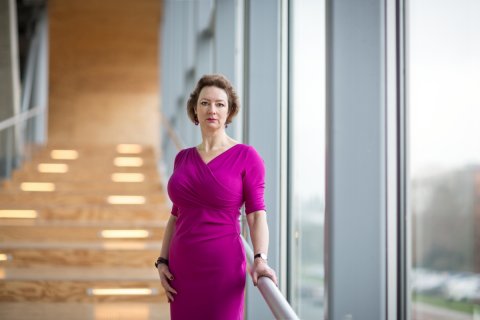Introducing Distinguished University Professor Naomi Ellemers

There have recently been several new professors appointed to the Faculty of Social and Behavioural Sciences. Who are they and what have they come here to do?
Naomi Ellemers is a social psychologist and a member of the Royal Netherlands Academy of Arts and Sciences (KNAW). She conducts research into power and status differences, diversity in organisations, ethical climate and employee motivation. Prof. Naomi Ellemers has been a Distinguished University Professor since 2015. She held her inaugural lecture this spring. 'All too often, diversity policy is based on just a nice idea.'
As a Distinguished University Professor, you have an exceptional role. Distinguished professors are appointed because of their vision that transcends disciplines, and for their international excellence. They have the freedom to work on innovative education and interdisciplinary research. How do you like it as a professor in the Faculty of Social and Behavioural Sciences?
'Actually, I've got a special role. Because I work across different faculties, it's harder to get to know everyone in my immediate workplace. For example, I don't attend regular education meetings. So I haven't got very many connections within my own faculty yet, but I do speak to people throughout the university as a whole. What I find very special is that this position provides the opportunity to do a lot of research. Sometimes headhunters call me for a management job: “We're looking for a woman, so we're approaching you.” But my ambitions are all about content. I want to do research. That's why I'm so delighted that we've just secured that major grant for the SCOOP programme. I also want to make scientific output more visible beyond the university world.’
Which of your research projects has had a lot of social impact?
'The research into gender bias in the NWO process - that's the Dutch Organisation for Scientific Research - created quite a stir. Romy van der Lee and I demonstrated that NWO committees judge women who submit a VENI application less favourably on their research qualities than men. Never before have I received so many responses to my research - also negative ones. That research put a cat among the pigeons. It obviously struck a nerve because afterwards, the NWO asked us to develop a procedure to eliminate gender bias. We are now conducting a pilot - before embarking on something like that, you first need to know that it'll actually have some effect. All too often, diversity policy is based on just a nice idea. It's important that you first determine in practice whether or not something really works. I'm also part of the university's Diversity Taskforce. Of course, there's plenty of theory and knowledge about this subject here at the university, but applying it can be quite hard. In terms of diversity, Utrecht University is an organisation much like any other.'
Who do you look up to?
The American lawyer Joan Williams. She's just visited Utrecht University. For me, she's an inspiring example of how to share scientific knowledge with those on the ground. She's developing evidence-based tools, which is what I try to do here as well. She has written a book called What Works for Women at Work, which sums up all the research done in this area but is also full of personal anecdotes about bias, including action plans to deal with it. I'll be pleased to give a copy to anyone who wants to know more about this subject.'
What would you do if you weren't a scientist?
'In the past, I thought: if I fail in science, I'll start a flower shop. But I'm afraid I'm not commercial enough for that. I've also done a lot of dancing; I even taught it. I would have really enjoyed working in a dance school! But at the moment a lot of dance schools are not doing well, so that's not a good idea either. I have been ballroom dancing with my husband. I really love doing that. And it's healthy, giving the brain a break, and just beautifully moving to music.'

